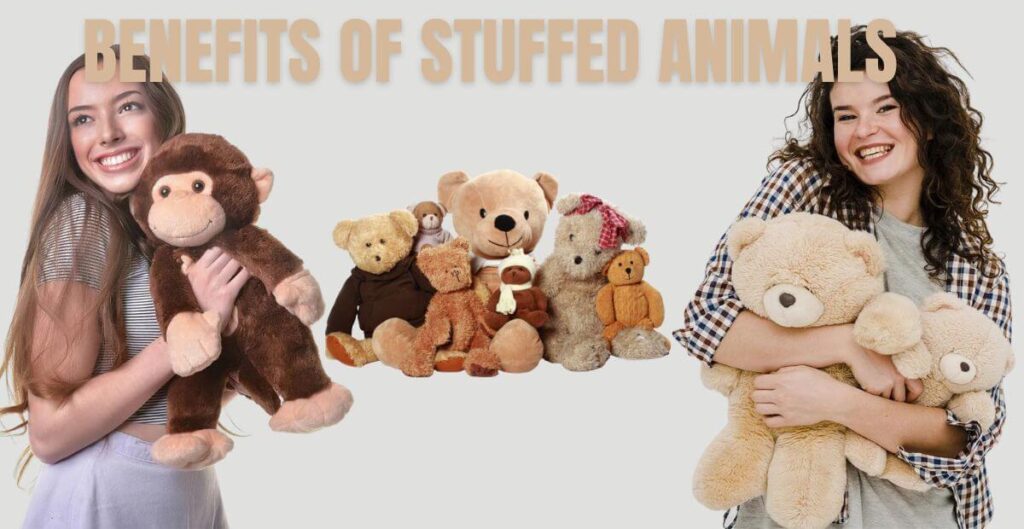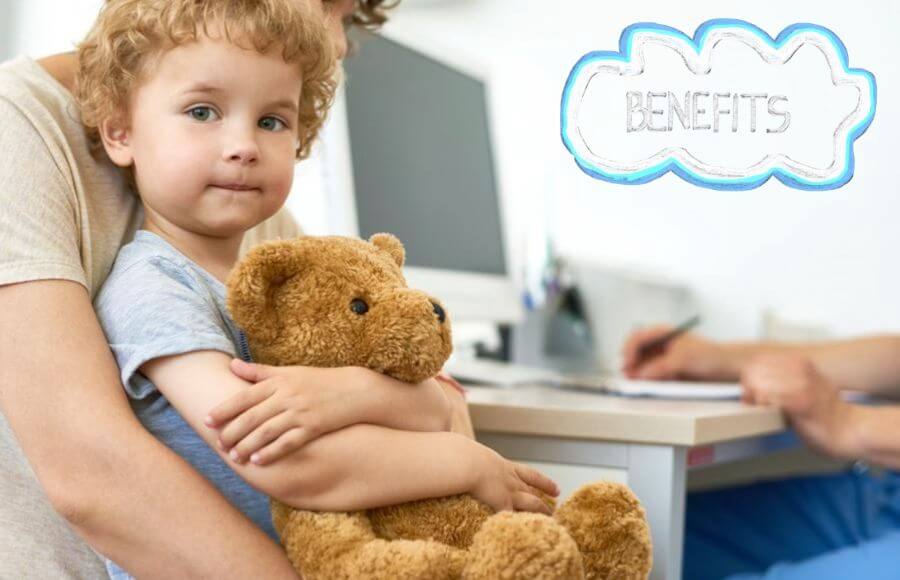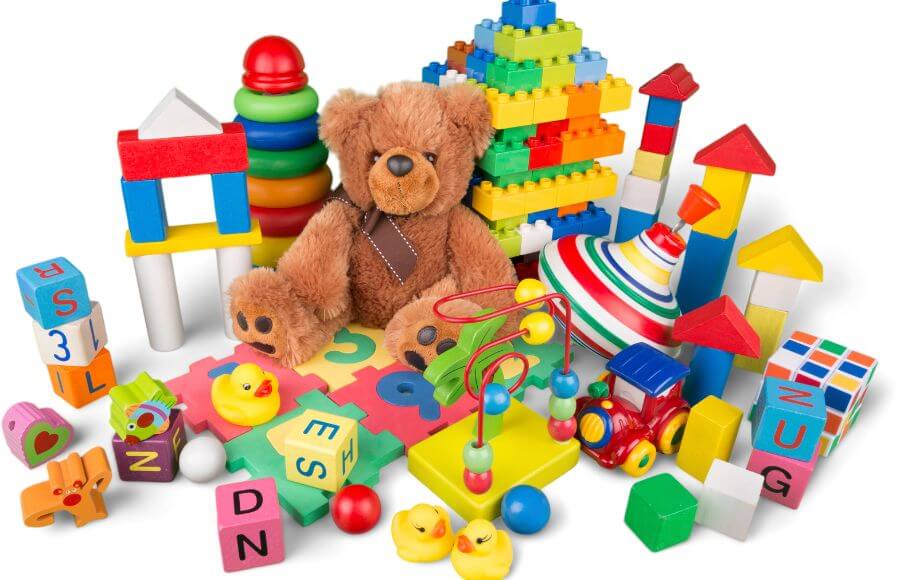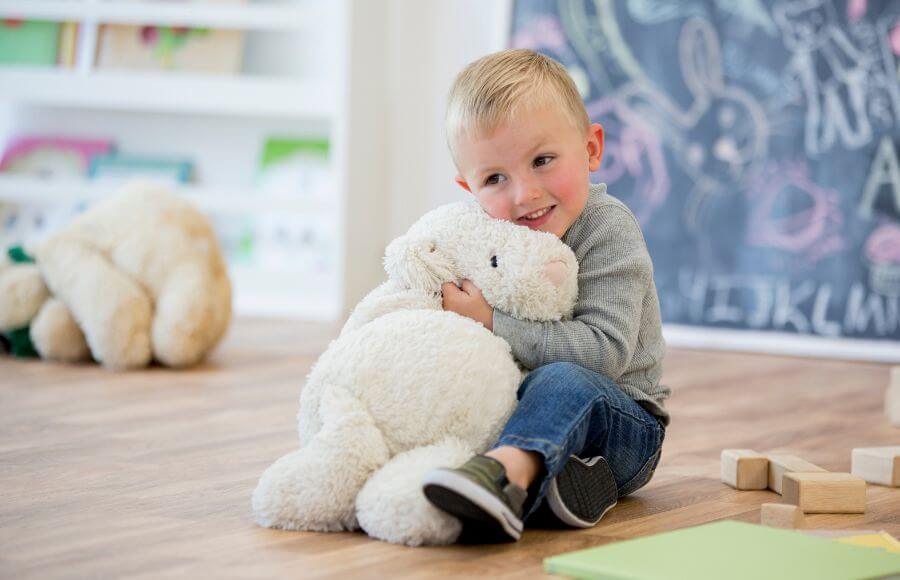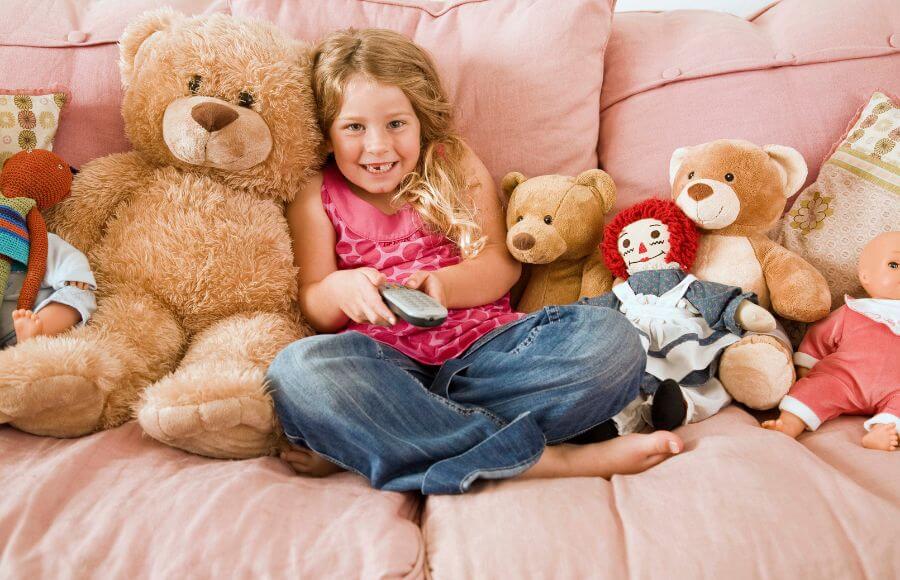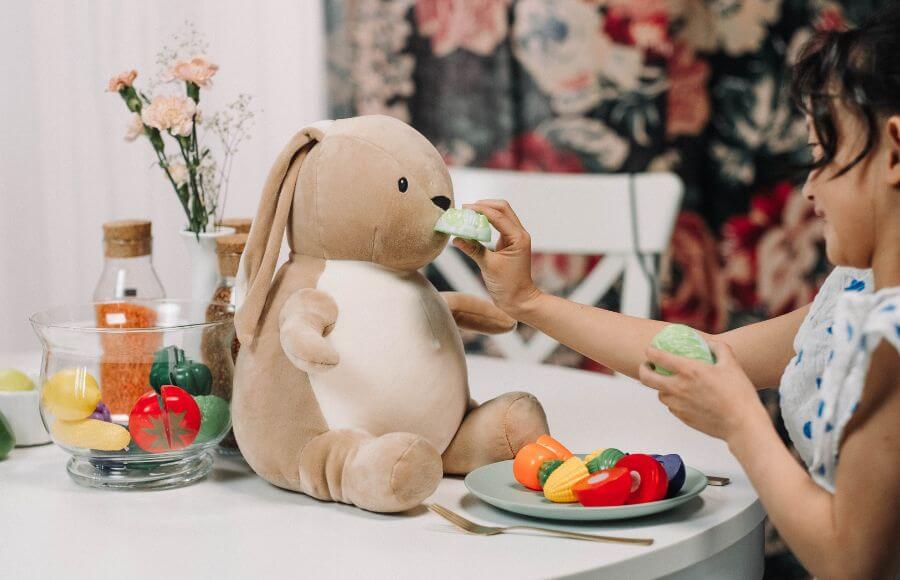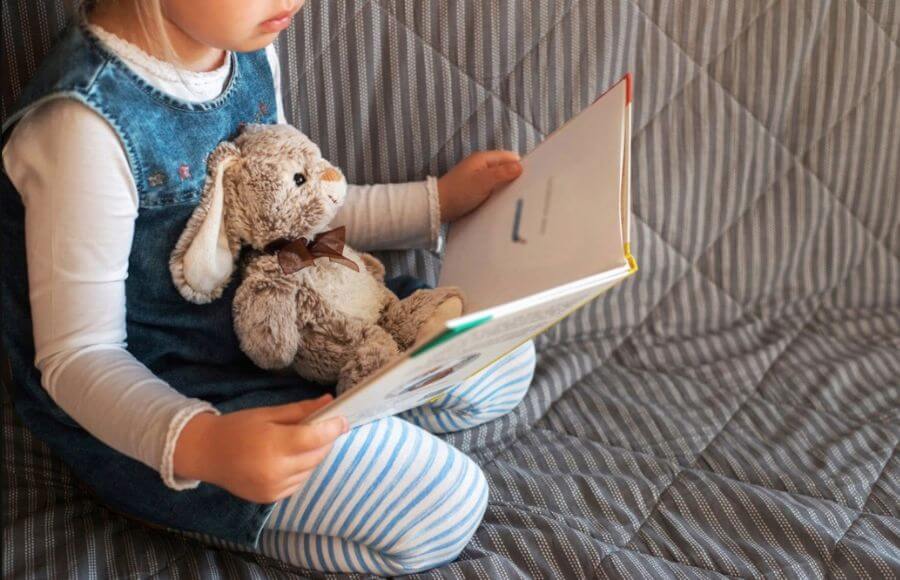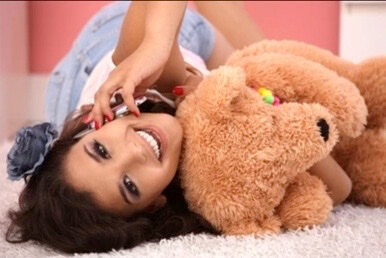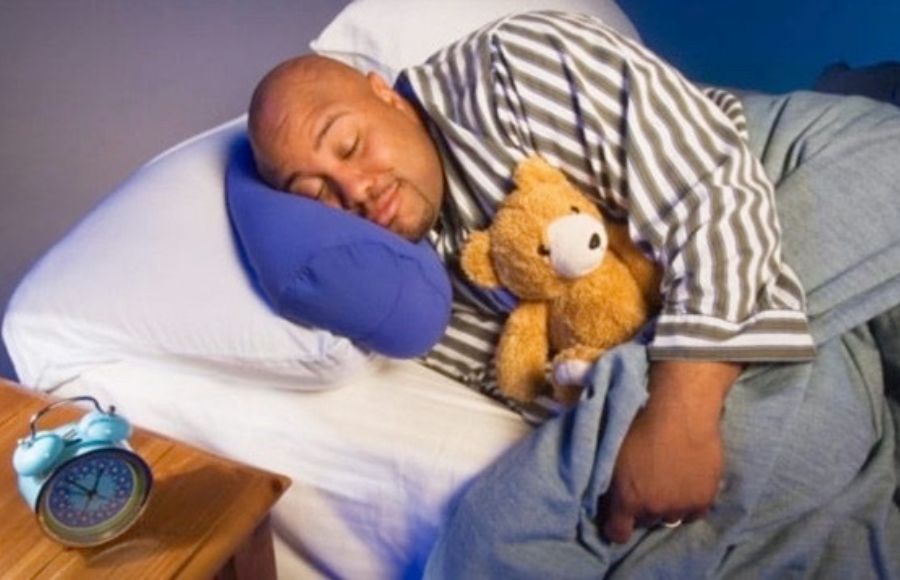Blog
Benefits of Stuffed Animals
Kids and adults have harnessed the benefits of stuffed animals throughout the last 50 years. They have been beloved toys for generations and provide comfort, companionship, and relaxation for kids and adults. These soft and cuddly toys can help alleviate stress and anxiety, improve sleep, and provide security.
Whether it’s a teddy bear, plush unicorn, or stuffed dog, these simple toys offer numerous benefits for people of all ages. In addition, they can stimulate the imagination and creativity in children, promoting play and learning. Scientists can track the benefits of weighted stuffed animals for adults; also, plush toys can act as a nostalgic reminder of childhood memories and bring joy to their daily lives. So embrace your inner child and cuddle up with a stuffed animal today!
Often, a stuffed animal is one of a child’s first friends. The bonds children develop with their stuffed toys help them learn and grow, all while having fun.
Grow your appreciation and understanding for your child’s cuddly companions. So today, we will take a walk in the realm of the benefits of stuffed animals for adults and the benefits of hugging a stuffed animal for kids and adults.
I: Benefits of Stuffed Animals For Children
So What do stuffed animals teach? And Can stuffed animal help with stress? And What skills can we learn from stuffed animals? The short answer is yes, yes and yes. Stuffed animals bring comfort and joy to kids, helping them cope with anxiety, stress, and mental health disorders. Playing with these beloved toys enhances language skills, social development, and literacy. Stuffed animals also aid in developing multiple life skills through role play and offer a sense of security. Even as adults, many still sleep with their childhood stuffed friends, highlighting their lasting benefits. So here are 5 reasons why stuffed animals are a great idea for your kid.
Develop Your Child’s Social Skills
Children enhance their social skills by playing with plush animals. They may learn to be friendly and loving by taking care of their soft toys. Socializing with stuffies prepares newborns and toddlers for interacting with humans.
While toddlers naturally acquire social skills with their toys, adults may also utilize these toys to teach lessons. For example, an adult might pretend that a toy is in a circumstance that makes the item “experience” an emotion, such as grief, and then ask the kid what they should do to help the toy feel better. The child’s attachment to the toy might make learning from these make-believe settings simpler.
Read More: Best Stuffed Animal For Girlfriend
Provide Comfort and Security
Stuffed animals are great when it comes to making youngsters feel secure. Children are inherently interested, but they also need to feel safe. Babies and toddlers need security, and a plush animal is a lovely and easy way to give this.
Young ones may squeeze their soft toy to release tension and reduce anxiety. Stroking their toy animal’s hair may help relax youngsters and tell them everything is fine. Over time, a treasured item might become more and more comforting to a youngster.
Early Language Development
A plush toy is the ideal listening buddy for your growing conversationalist. As newborns babble, they learn the relationship between their mouth motions and the sounds that produce words. Adults may also play with infants, taking up the role of the stuffed animal and encouraging the baby to keep talking.
Toddlers may carry on chats with their plushies and improve their communication abilities. Even though stuffed animals don’t communicate, children will make room to listen to their stuffed animals before they vocally answer.
Foster Creativity and Imagination
For kids, plushies stimulate children’s creativity and imagination. By engaging children’s imaginations, toys enhance kids’ confidence, problem-solving abilities, skill, and strength. Children build fantasy worlds and conquer problems with their plush animals. And although these qualities are created in a play environment, they become a part of how youngsters interact in the actual world.
Plush toys enable youngsters to move at their speed and participate in their unique interests. One moment, your youngster could explore outer space with their toy. Next, your youngster may be back home, making an afternoon snack. Everything is possible for your youngster and their friend in this beautiful moment.
Early Literacy Skills
As we already know, youngsters live in a universe full of adventure and imagination and feel comfortable and fun around their favorite toys. No matter whether a girl or a boy, everyone once had a stuffed companion, which they most adored throughout their youth. It may be a bear, a doll, a dog or another cotton-stuffed animal that follows your lovely newborn everywhere. Recent research discovered that your child’s plush buddy might encourage reading habits in them. Researchers concluded that providing youngsters with stuffed animals for a stay at the library stimulates children to read, even long after the sleepover occurred. This is the first time research has demonstrated that stuffed animal sleepovers are an excellent strategy to motivate youngsters to read. The research findings suggested that stuffed animal sleepover programs may enhance children’s prosocial behavior by encouraging them to read the books the stuffed animals had selected during their stay. The researchers from Okayama University, Kanazawa University, Osaka Institute of Technology and Kyushu University in Japan stated that their findings promote the worldwide expansion of this strategy, which favors children’s reading habits.
Stuffed animal sleepover programs were created to get youngsters interested in picture books. Children transported their toys to a library for the night, where the animals looked for books they wished to read. Meanwhile, the employees and volunteers shot images of the plush toys. The youngsters gathered their stuffed animals and the images of what they did over the night the following day. They were also provided the books their animals selected to read. The sleep programs were performed all across the globe for the outcomes, but until recently, there has yet to be scientific proof that they influenced children’s reading habits. This study indicated that youngsters who took part in stuffed animal overnight programs read picture books to their stuffed animals much more.
II: Benefits of Stuffed Animals For Adults
Stuffed animals are not just for kids! As adults, these plush companions can bring comfort, reduce stress and improve mental health. In this second chapter, we will answer the most frequently asked questions about the benefits of stuffed animals for adults. From their role in promoting relaxation and sleep to their impact on our emotions and well-being, we will explore how stuffed animals can enhance our lives. We will try to make a grand tour from What skills can we learn from stuffed animals to do stuffed animals help with depression, and all that is between.
What Skills Can We Learn From Stuffed Animals?
Stuffed animals are a captive audience for your young one to read to! Your young one may utilize those newly-acquired linguistic abilities to test their reading comprehension! And we’ve found the right book to recommend; Hooray, Jeremy! You Did It! It’s about a child’s first milestones and features 1 of 5 sidekicks that we sell plush toys!
Also, As your youngster learns to communicate more and more, their stuffed companion makes for a terrific conversationalist!
And these imagined talks help tiny ones acquire the courage to keep talking and create empathy for others.
Do Teddy Bears Help With Loneliness?
Research suggests that stuffed animals may help ease adults’ stress in the same way they benefit youngsters. Sleeping with a plush animal might assist with loneliness, quieting those midnight thoughts that sometimes seem overpowering. Look no further if you’re seeking methods to handle anxiety and tension. Grab yourself a lifetime companion from the plushie selection at I Heart Guts.
Plush toys may relieve anxiety naturally by delivering a feeling of reassurance. Primarily during times of transition, stuffed animals may deliver a consistent feeling of friendship since you know the toy will be there at the end of the day. They help soothe loneliness, which means you can never have too many. Three’s a crowd, so grab your plush organs in pairs.
Can Stuffed Animals Help With Stress?
While you want comfort, there’s also the science behind why a blanket may help you feel tranquil. The weight and pressure of a weighted blanket stimulate your autonomic nervous system, the portion of your body that governs your fight-or-flight impulses. The pressure from a blanket may reduce your heart rate and breathing — similar to box breathing — and help you transition into sleep.
In our hunt for comfort before bed, Dr. Chris Winter, sleep expert, Sleep.com adviser, and author of “The Sleep Solution: Why Your Sleep Is Broken and How to Fix It,” feels the secret may be an unexpected sense: scent.
Smells move straight to the olfactory bulb in the brain. And that bulb is related to the amygdala and hippocampus, which manage our emotions and memory.
“Smell is such a powerful trigger of memory,” Winter explains. “And memories may assist make you emotionally comfortable while attempting to sleep.”
You grab that teddy bear because it contains a familiar fragrance from childhood or your previous night’s sleep.
Do Stuffed Animals Make You Happier?
We know that stuffed animals have tremendous health advantages, but did you realize that stuffed animals may frequently have a similar impact on people? Yes! Stuffed animals have even been formally advised in psychotherapy for persons with PTSD, bipolar disorder, and other mental diseases.
Stuffed animals are also utilized in certain sorts of treatment. They may help us mourn and deal with tragedy. M. Rose Barlow, Professor of Psychology at Boise State University, states, “Animals, live or stuffed, may enhance therapy for both children and adults by offering a place to experience and express emotions, a sense of unconditional support, and grounding.”
The lesson of the tale is to cling to your childhood snuggle bug. They’re the OG friends with benefits. Mental health advantages that is—and let’s be serious, that’s a better snuggle partner than most of your exes.
Read More: Popular Stuffed Animals
Do Stuffed Animals Help With Depression?
Well, fluffies are deemed “comfort objects” for the simple reason that they can soothe children’s distress.
However, therapists employ stuffed animals as a treatment to assist in relieving patients who suffer from sorrow and loss for both children and adults.
Symptoms of detachment, dissociation, and disordered connection, may start from infancy. That’s why owning a stuffed toy can perform wonders to decrease the effect or assault of these mental disorders. It provides security, offers support, and rebuilds damaged attachment relationships.
Last but not least, cuddly toys help maintain your hormone levels regularly. Like cortisol, there are a significant number of hormones that govern our body’s normal functioning. A disruption in the amount might be a serious concern. We are having a stuffed toy may assist in preserving a person’s mental equilibrium by drawing more physical and psychologically steady surroundings.

